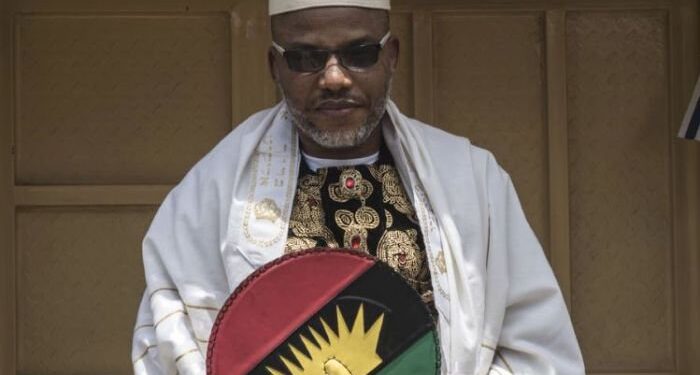Detained IPOB leader Nnamdi Kanu has notified the Federal High Court of his readiness to commence his defence, submitting a list of 23 witnesses that includes serving governors, former military chiefs, and current security heads.
In a motion personally signed and filed on Tuesday, October 21, Kanu informed Justice James Omotosho that he intends to testify on his own behalf and has requested a 90-day period to present his complete defence when proceedings begin on Friday, October 24.
The development follows a court-ordered medical examination that declared the separatist leader fit to stand trial, clearing the path for the resumption of the long-stalled case.
Kanu divided his proposed witnesses into two distinct categories in his court filing. The first group comprises what he termed “ordinary but material witnesses” who will voluntarily provide testimony. The second category consists of “vital and compellable” witnesses whom he seeks to summon through the court’s authority under Section 232 of the Evidence Act, 2011.
Among the high-profile figures Kanu wants compelled to testify are retired General Theophilus Danjuma, former Defence Minister, and retired General Tukur Buratai, former Chief of Army Staff. He also listed Lagos State Governor Babajide Sanwo-Olu, Imo State Governor Hope Uzodinma, FCT Minister Nyesom Wike, Works Minister Dave Umahi, and former Abia State Governor Okezie Ikpeazu.
The witness roster extends to include Abubakar Malami, the immediate past Attorney-General of the Federation, Ahmed Rufai Abubakar, former Director-General of the National Intelligence Agency, and Yusuf Magaji Bichi, current Director-General of the Department of State Services. Several other witnesses were mentioned whose identities Kanu did not disclose in the public filing.
The IPOB leader plans to offer sworn testimony denying the charges against him while providing what he described as the political context surrounding his statements and actions. He assured the court that sworn statements from all voluntary witnesses would be provided and that the prosecution would receive prompt notification of all defence preparations.
Kanu’s legal team stated their commitment to ensuring that “justice is not only done but manifestly seen to have been done,” emphasizing transparency throughout the defence proceedings.
The motion represents a strategic shift for Kanu, who had previously filed a preliminary objection challenging the Federal High Court’s jurisdiction to try him. That challenge remains unresolved, but his new filing indicates a parallel strategy of preparing a substantive defence should the jurisdiction argument fail.
His request for a three-month defence window reflects the complexity of his case and the logistical challenges of coordinating testimony from such prominent witnesses, many of whom hold current government positions.
The trial preparations unfold against a backdrop of renewed tensions surrounding Kanu’s detention. Earlier this week, a magistrate court in Abuja ordered the remand of 13 individuals, including Kanu’s special counsel Aloy Ejimakor and his brother Emmanuel Kanu, at Kuje Correctional Centre.
The group faces charges of criminal conspiracy, disobedience to lawful order, inciting disturbance, and disturbance of public peace under Sections 152, 114, and 113 of the Penal Code Law. Authorities arrested them following a protest demanding Kanu’s release.
The 13 defendants appeared before the court on two separate first information reports. After a brief recess, the magistrate ruled they should remain in custody pending their scheduled arraignment on October 24, the same day Kanu’s defence is set to commence.
The simultaneous legal proceedings highlight the continued controversy surrounding Kanu’s prosecution and the broader Biafran separatist movement, which the Nigerian government has designated as a terrorist organization.



















